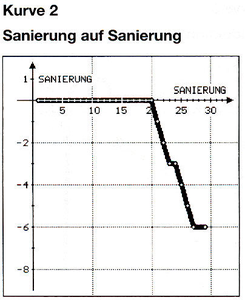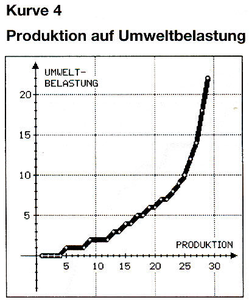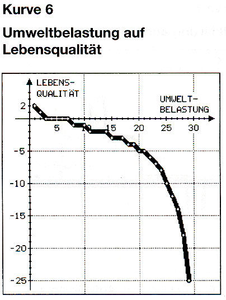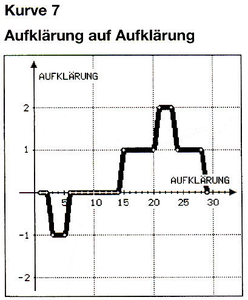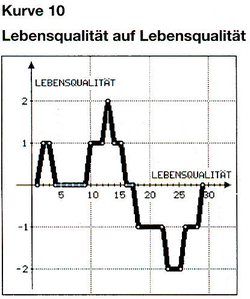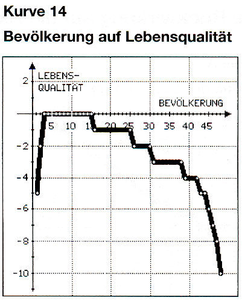Ecolopoly
| Ecolopoly | |
|---|---|
|
logo |
|
| Game data | |
| author | Frederic Vester |
| publishing company | Ravensburger |
| Publishing year | 1980, 1984 |
| Art | Board game |
| Teammates | 1 to 6 |
| Duration | 90 minutes |
| Age | 14 years and older |
Ökolopoly, a cybernetic environmental game , is a simulation game developed by the cyberneticist and environmental researcher Frederic Vester , an innovative board game that allows playful access to dealing with repercussions. It simulates the relationships between society, the economy and the environment in a metropolitan area; the players act as decision makers in politics and business and try to control the system in its interactions.
overview
The game principle is based on cybernetics and networked thinking and builds u. a. based on the principle of Frederic Vester's paper computer . The different areas have non-linear influences on each other, so that the players have to deal with the peculiarities of exponential growth, feedback with time lag, limited load-bearing capacity of systems, excessive factors and collapses.
Vester designed this game in 1980 and first published it as a fold-out insert in the magazine Natur . In his international traveling exhibition Our World, a networked system , a large playable exhibit was realized by Ökolopoly. At the Munich International Horticultural Exhibition in 1983 , it was first offered as a board game in the information pavilion of the Bavarian Ministry of the Environment designed by Vester. In 1984 Ravensburger launched Ökolopoly for the general market. While the magazine version still used marker stones on tables to record the influencing factors, the developed version as a "turntable board game" had adjustable number wheels. A computer game version of Ökolopoly was later released . This computer version was continuously developed and appeared under the title ecopolicy as CD-ROM for all Windows systems.
Game material
The board game consists of a game board with nine adjustable wheels each labeled "Action Points", "Renovation", "Production", "Environmental Pollution", "Enlightenment", "Quality of Life", "Multiplication Rate", "Population" and "Politics". On one side of the game board shows the fantasy land "Cybernetia" and in some editions on the reverse the fantasy land "Cyboria". There is a lap counter that shows when an event card must be drawn. The game contains event cards, a block with protocol sheets, instructions and an information booklet with background information.
Style of play
Ökolopoly is intended for one or more players. Several players have to consult and decide together. There is no variant in which several players can play against each other.
The players represent the government of a country. Either it is the industrial state "Cybernetia" or the nomadic people and developing country "Cyboria". "Cybernetia" is easier to obtain than "Cyboria".
The game board consists of a number of finite automata that are linked by effects and control loops . The player can distribute a given number of action points to the areas “production”, “quality of life”, “rehabilitation” and “reconnaissance”. To do this, turn the corresponding wheels by as many steps as you want to distribute points in this area. The success of his decisions and investments can be seen in the “Politics” area.
The areas of life are linked with arrows. If the player now turns the wheel of an area of life, a number and arithmetic operator result in a field. This field now points to another wheel and is directly linked to another area of life in which the player has to turn as many steps in one direction or the other as indicated in the field. So has z. For example, the area of "production" has a direct impact on the area of "environmental pollution", in which more production results in higher environmental pollution. The learning effect and cybernetic thinking are only encouraged if the player actively follows the effects and repercussions his decisions have on the individual areas of life. At the end of a chain, the action points fill up again, closing the control loop. The better the players master the system, the more action points they can distribute in the next round and the higher their rating in the “Politics” area.
The individual steps can also be listed on an enclosed report sheet so that they can be evaluated later.
Effects of the automata on one another
The effects of the "cybernetics" variant:
Retroactive effect of the machines on the distributable action points of the next round:
Competitions
Competition in networked thinking: From 2009 to 2012, so-called ecopolicyads were held at German schools with the multimedia computer version of the game ecopolicy , in which teams competed against each other at various levels up to national competition and demonstrated their cybernetic thinking. Over 175,000 pupils and their teachers took part in the competitions during the project period and tested the interaction of complex influences with limited control options. Malik Management Zentrum St. Gallen AG , which has taken over all rights to Frederic Vester's works, initiates and promotes the international use of the game worldwide. In Poland, Austria, Australia and Vietnam, and also in Germany, schools and partners are running their own projects in cooperation with Malik Management to enable young people to use ecopolicy to gain access to networked thinking and how to deal with complexity. In 2013, well over 50,000 young people were reached in Vietnam.
variants
A lap counter and event cards can be used as a game variant in the board game. For this purpose, a special wheel is turned in each lap and a lightning bolt symbol appears in a window for some laps. In this case an event card must be drawn. The event cards have a positive or negative effect on the individual areas from the outside. So z. B. due to increased composting, the environmental impact can be turned back by two steps. In "Kyborien" the lap counter has another development program: an action point credit that must be paid back in later rounds.
As an extreme variant, it was stated in the instructions how the individual wheels can be expanded with numbers in the "Stop" positions. In these positions, the windows do not initially show any numbers, but these can be written in by hand.
Web links
- Ecopolicy at Frederic Vester
- Test of the computer game at goodolddays.net
- Ökolopoly at spielarchiv.de
- Ökolopoly in the Luding games database
- Oekolopoly in the board game database BoardGameGeek (English)
- Illustrative video in which Danish scientist Jeppe Læssøe presents the board game
- German-language explanatory video for the game on YouTube
Individual evidence
- ^ A b Frederic Vester: Metropolitan areas in crisis . dtv non-fiction book, 1991, ISBN 3-423-11332-4 , pp. 147–153.
- ↑ frederic-vester.de: Ecopolicy


